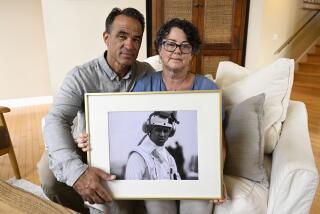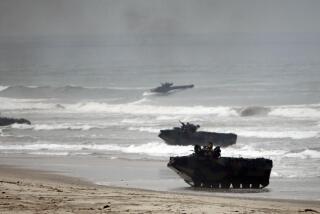Marine convicted of deserting Iraq combat post, Camp Lejeune
A Marine who disappeared from a U.S. military base in Iraq in 2004, then abandoned his unit in North Carolina the following year, was convicted Monday on two counts of desertion.
A military judge at Camp Lejeune, N.C., found Marine Cpl. Wassef Ali Hassoun guilty of deserting his combat post in Fallouja, Iraq, in June 2004 and deserting his Marine unit at Camp Lejeune, N.C., in January 2005. In both instances, Hassoun fled to his native Lebanon.
Hassoun, 35, a naturalized American citizen, was also found guilty of causing the loss of his service-issue M9 pistol, which he took with him during the 2004 disappearance.
He was sentenced to just over two years in jail — 735 days — reduction in rank, forfeiture of pay and allowances, and a dishonorable discharge.
Hassoun’s lawyer said he was kidnapped from his base in 2004 and held by insurgents before a tribal sheikh negotiated his release. Hassoun appeared, blindfolded, in a purported hostage video in which a sword was held over his head.
But he turned up unharmed at the U.S. embassy in Beirut two and half weeks after his disappearance.
He was returned to the U.S. to face trial but disappeared again in January 2005 during an approved Christmas holiday leave to visit his parents and brothers in Utah. He said he secretly flew to Lebanon to negotiate a divorce with his wife’s Lebanese family.
Hassoun, who testified at the two-week court-martial, pleaded guilty to taking an unauthorized leave in 2005 but pleaded not guilty to charges of desertion, larceny and destruction of government property.
Hassoun’s ethnic and religious background became an issue during the court-martial. His lawyer, Haytham Faraj, said fellow Marines ostracized Hassoun and became suspicious of his motives after he spent much of his time with Iraqi civilians working on the Fallujah base.
A prosecutor described Hassoun as “torn between two cultures: the Marine Corps and his upbringing as a Sunni Arab.” Prosecutors said Hassoun was disillusioned with the Marine Corps and longed for his Lebanese wife in 2004.
They said he complained about an extended deployment and refused to interpret interrogations in which Islam was discussed. Hassoun was an Arabic-language interpreter for interrogation sessions of suspected insurgents.
Hassoun openly threatened to leave for Lebanon, prosecutors said, and made elaborate plans to slip away, including asking an Iraqi translator if he could hide in his home.
“He didn’t want to die in Iraq,” a prosecutor, Capt. Christopher Nassar, told the court. “He left his fellow Marines behind.”
Twitter: @davidzucchino
More to Read
Start your day right
Sign up for Essential California for news, features and recommendations from the L.A. Times and beyond in your inbox six days a week.
You may occasionally receive promotional content from the Los Angeles Times.







